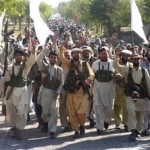 Pakistan has been the worst victim of terrorism inflicted by foreign and indigenous militants. Not only that dozens of innocent citizens are being filled daily, personnel of security forces and sensitive installations are also being attacked. The incumbent government has prepared the draft of Counter Terrorism Policy and seeks inputs from other political parties. However, it is felt that selective perception is not likely to help in coming up a consensus policy.
Pakistan has been the worst victim of terrorism inflicted by foreign and indigenous militants. Not only that dozens of innocent citizens are being filled daily, personnel of security forces and sensitive installations are also being attacked. The incumbent government has prepared the draft of Counter Terrorism Policy and seeks inputs from other political parties. However, it is felt that selective perception is not likely to help in coming up a consensus policy.
Mushahid Hussain Sayed, currently PML-Q Secretary General and former foreign minister during last toppled regime of Mian Nawaz Sharif has stressed upon Pakistan needs a vibrant counter terrorism policy. He has rightly emphasized that apart from Pakistan’s fight against indigenously driven terrorism and extremism the rulers have to be fully aware of the geopolitics of the region.
He highlighted Pakistan at present faced three concurrent conflicts: 1) the US war against Afghan Taliban, 2) Iran-Saudi proxy war and 3) an ongoing, low-key proxy conflict between Pakistan and India centering on Afghanistan. All these demand Pakistan should have an effective national security policy.
As against this, JUI-F has expressed its reservations on the proposed counter-terrorism policy of the government and termed it mere rhetoric. According to JUI-F Chief, Maulana Fazlur Rehman, serious strategy for talks with the Taliban is missing from the draft policy. JUI-F chief said mere administrative measures would not effectively end terrorism.
Though, the draft policy renews government’s commitment to fight terrorism, but reportedly contains no radical shift in the strategy for dealing with the problem other than a rare acknowledgment that ‘enabling environment’ existed in the country for the growth of extremism and terrorism.
The draft policy titled “National Counter-Terrorism and Extremism Policy” have five elements — dismantle, contain, prevent, educate and reintegrate — as against the 3Ds — development, dialogue and deterrence — a strategy adopted by the previous government for curbing militancy.
The JUI-F chief, who is believed to have some influence on the militant groups and tribal elders, said emphasis on administrative measures without appropriate political steps would not be a real policy option for combating terrorism.
“If the state wants to take administrative measures it can but shunning political option means setting up the national leadership for failure. Therefore, serious and meaningful dialogue with Taliban should be part of the counter-terrorism strategy.
Maulana warned any new conference should not sabotage the “existing national consensus on negotiations with the Taliban”. He said that if the JUI-F was invited to the proposed conference, it would make recommendations in the light of joint resolutions of the previous parliament and the decisions of the last All Parties Conference (APC) convened by his party in February.
According to Sayed, the issue of national security policy was a very vast one, spread over the longer term, involving a multi-faceted approach but immediate requirement was a counter-terror strategy to urgently ensure safety and security of the citizens and sensitive installations, where the GoP has failed miserably because the initiative lies with the other side, not the state.
This ad hoc, reactive moment to moment, incident by incident approach can best be summed as the 3Cs. Condemnation, Compensation and Cribbing, against either local law enforcing agencies or the proverbial ‘foreign hand’ which is never identified.
Syed suggested three things should be given top priority for a doable counter-terrorism strategy that included, an effective and autonomous lead organization like NACTA or Anti-Terror Task Force under the prime minister, good lean team led by a top-notch professional like ex-police officer and better coordination between civilian and military set-ups, federal and provincial governments, intelligence agencies and police and other law enforcement bodies. “This is not rocket science. If Sri Lanka can do it, why not Pakistan?” he asked.
PTI that rules Khyber Pakhtunkhwa (KP) now is not likely to make any impression because its chairman Imran Khan will be out of the country when Prime Minister Nawaz Sharif will be hosting a meeting of the heads of political parties to formulate a national security policy.
His absence from the meeting will surely be noticed because the PTI has emerged as a major political force after the general elections and the party has been stressing the need for a national counter-terrorism strategy. In his absence PTI will be represented at the meeting by its vice-chairman Shah Mehmood Qureshi and Khyber Pakhtunkhwa Chief Minister Parvez Khattak, who is also the party’s secretary general.
Before the government announced its plans to convene a meeting on national security, the PTI-led KP government had demanded arranging a meeting with the army chief so that something tangible on security issues could be discussed. However, it is on record that two previous such meetings organized before the general elections by the ANP and JUI-F were boycotted by the PTI.
However, the most disturbing point is that PPP and MQM which are the two political parties of Sindh have remained aloof. Despite the fact that the leadership of these parties came under attack of Taliban during election campaign and MQM still facing the brunt seems to have no interest in discussing Counter Terrorism Policy.
It’s genuinely very complicated in this busy life to listen news on Television, thus I just use the web for that reason, and obtain the most recent news.